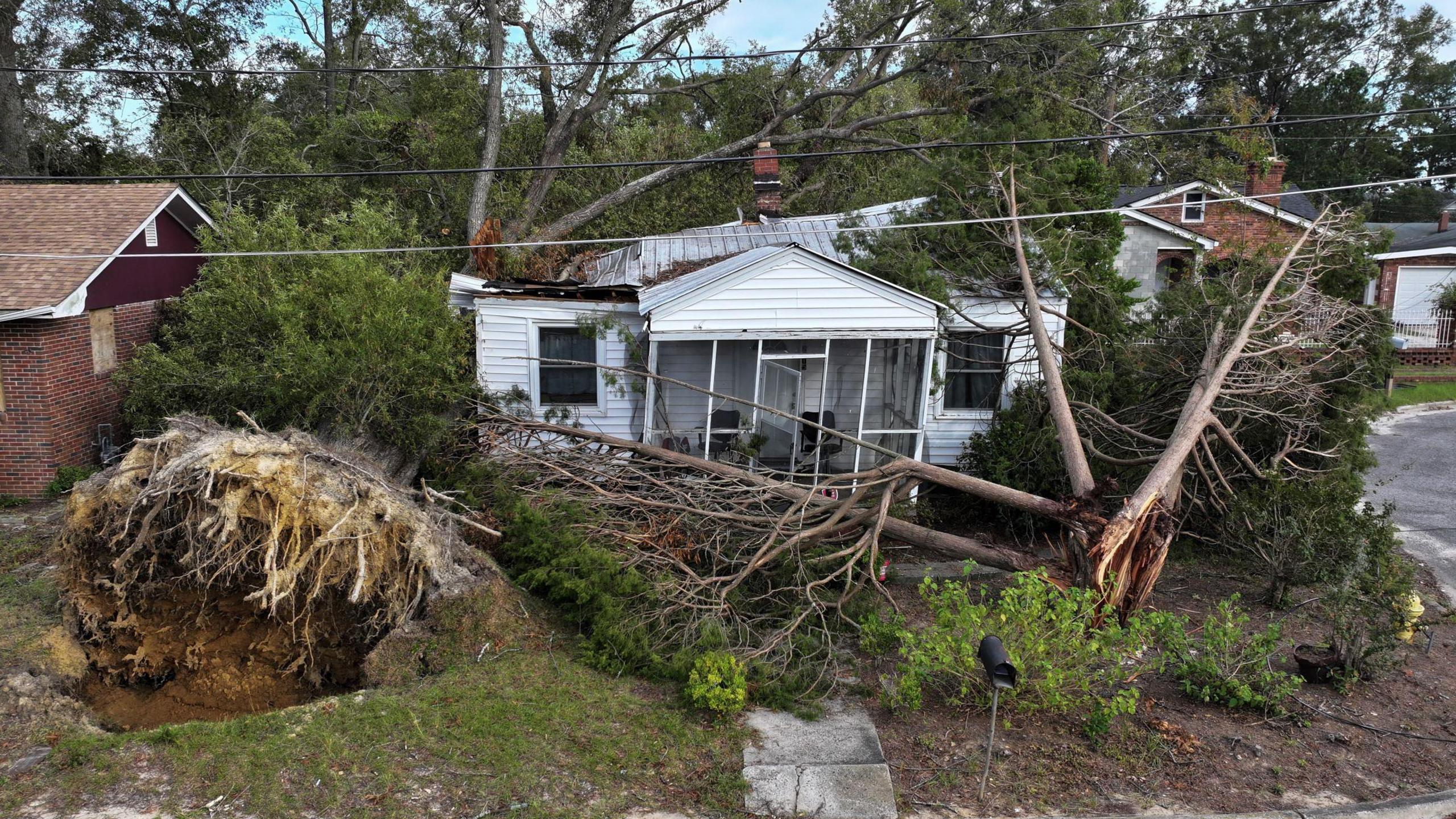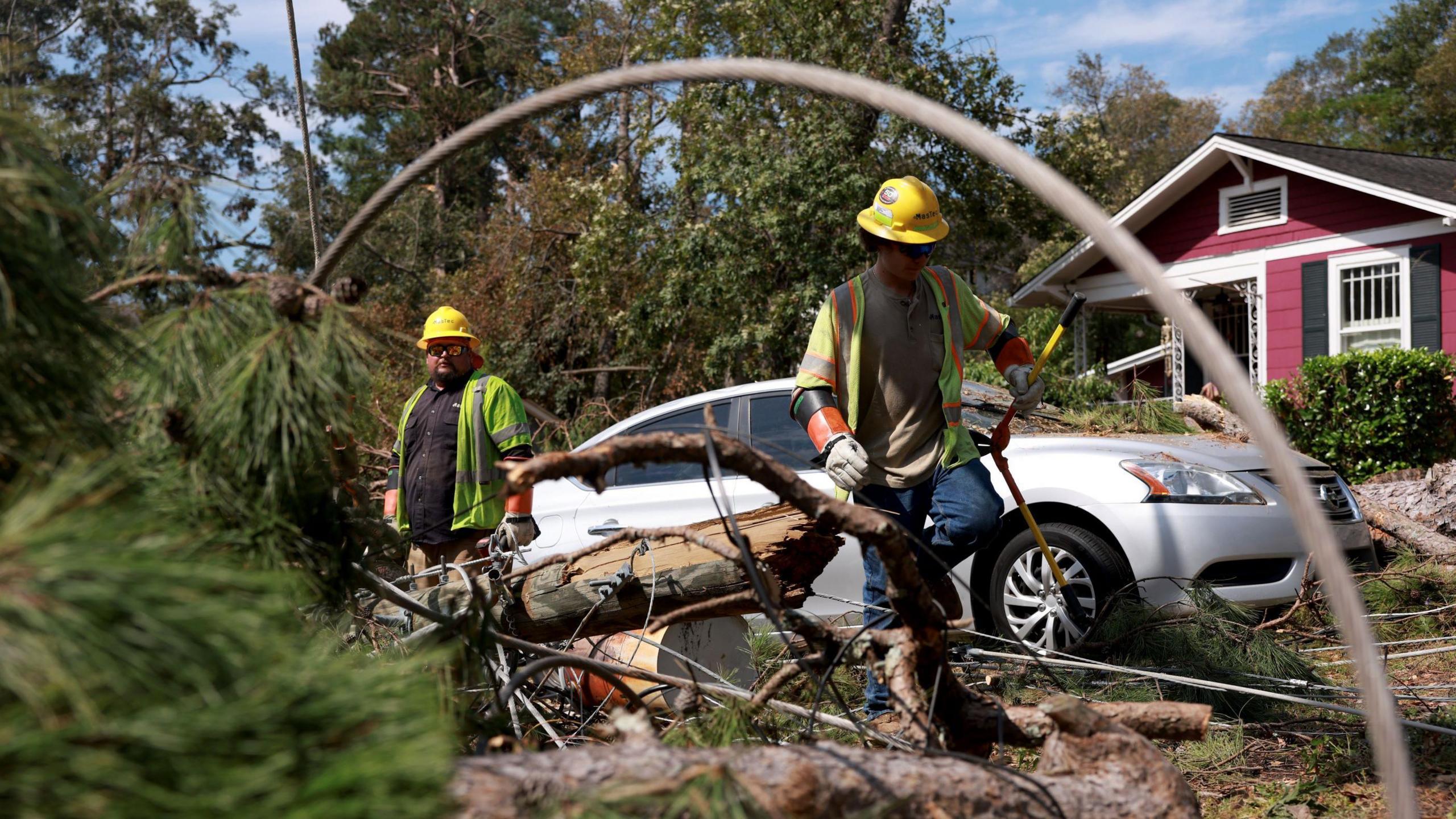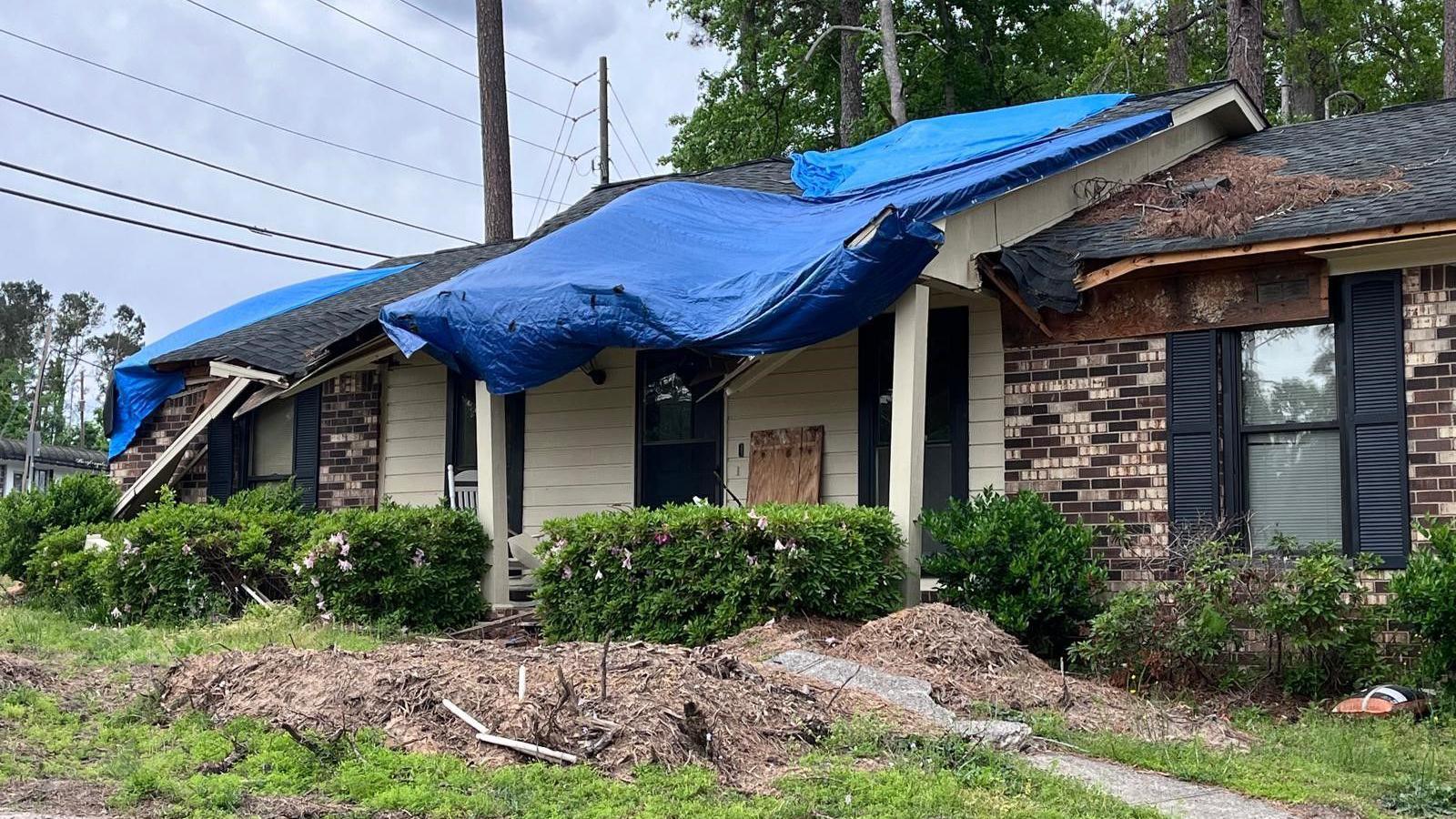'We need the Masters' - Augusta's adversity after Hurricane Helene

Residential damage in Augusta caused by Hurricane Helene has reached $282m (£220m)
- Published
The manicured grass around the entrance to Augusta National is pristine. It always is.
In the suburbs which circle the home of the Masters, though, it is a different picture.
Fractured trees sprawl across gardens. Rubbles of wood and brick stack high. Homes remain shattered. So do lives.
When Rory McIlroy and the world's best golfers arrived in Augusta this week, along with an estimated 200,000 fans, the devastation caused by one of the United States' deadliest natural disasters was laid bare before them.
In September, Hurricane Helene hit the south-eastern States - leaving death and destruction in its wake.
Augusta, nicknamed 'The Garden City' because of its natural greenery, felt its mighty force. The residents are still dealing with the effects.
"There were multiple hours of 80mph winds which laid all of the forest down," lifelong Augusta resident Tonya Bonitatibus told BBC Sport.
"A lot of trees fell on top of houses and crushed cars – I lost my truck. But I was a lucky one."
Deaths and destruction - Helene's impact
When Helene reached the American coast, it brought extreme winds, numerous tornadoes and flooding across several states.
According to the National Hurricane Center, Helene is responsible for at least 249 fatalities in the United States, including at least 175 direct deaths.
It was the deadliest hurricane in the US since Katrina in 2005.
Florida, on the south-eastern frontier, bore the brunt of the force. But Helene quickly headed further north, engulfing South Carolina, North Carolina and Georgia.
Augusta, which is the third most populous city in Georgia, was attacked by gusts of wind which reached 100mph through the night of 26 September - with stark consequences.
"Helene's winds were responsible for killing 11 people - all from trees falling onto homes in the greater Augusta area," a spokesperson for the National Hurricane Center told BBC Sport.
"At least 362 homes and buildings were destroyed, while 3,000 others suffered major damage, and 3,500 others experienced minor to moderate damage."

Augusta officials say almost 17,000 fallen trees have been removed from the city
Residents living close to Augusta National had to leave their homes. Thousands were left without electricity and water.
Joseph Crosby, his wife Kasey and their three children still cannot live in their storm damaged home, about five miles from the iconic course.
He recalls watching a mature Ash tree, which he estimates had grown over 60 feet tall, being "blown around like a rag doll".
"I think your brain compartmentalises what you're going through," Joseph recalls of the night itself.
"All you think of at that moment is just survival and keeping your kids safe.
"I just remember thinking if the tree came down on our house or something were to happen, would my kids be OK?"
The Crosby family home is among 1,695 properties damaged in the city of Augusta. City officials estimate the cost of residential losses has reached $282m (£220m).
"Folks here are resilient but this won't soon be forgotten. It reminds one how frail and furious nature can be," local journalist Joe Kovac told BBC Sport.
'Only regular patrons will notice course damage'
Augusta National Golf Club was not as badly affected as the suburbs nearby.
But it did not escape.
"After the storm when you rode around Augusta National, on Washington Road, the pile of trees was above your car for mile after mile," said Bonitatibus.
Trees came down in their hundreds on the famed course, damaging one of golf's most famous greens on the par-three 16th.
Walking the course now is a lighter, less claustrophobic experience.
You can see through wooded areas that previously screened individual holes and made them their own isolated stations.
The separation of the ninth and first fairways is less cluttered.
Coming down the 11th hole it is possible to see into the neighbouring Augusta Country Club course.
The wooded area to the right of the newly-laid 16th green will have fewer shadows when the world's best golfers begin their challenge for the famous Green Jacket on Thursday.
Speaking in January, Augusta National Golf Club chairman Fred Ridley said: "As far as the golf course goes, it's in spectacular condition.
"We had minor damage to the course, the playing surfaces themselves, but we were able to get that back in shape.
"I don't think you're going to see any difference in the condition for the Masters this year."
Kovac, who recently wrote a vivid account of the city's recovery process,, external agreed.
"I was struck by how emerald-green it is, at least the periphery. It is as if the grass never flinched," said the Atlanta Journal-Constitution reporter.
"The kerbside lawn around the course perimeter looks manicured to the hilt. Only regular patrons will really notice trees are missing.
"But further into the miles of neighbourhoods ringing the National one cannot help but see the wreckage and its remains."
How community spirit & 'philanthropic' Masters is helping rebuild
Driving around Augusta, it does not take much to notice the roadsides still populated by fallen trees - oaks, ash and giant pines.
Long established homes bear scars of severe roof damage, much of it protected only by the flimsy tarpaulins.
Life has been dominated recently by the need to join lengthy queues for construction and repair workers.
"It's been a journey, just rebuilding. It's been really neat to see the community come together in a town like this," said Kasey Crosby.
"We've heard lots of stories of neighbours helping each other.
"Cutting neighbours out of their driveways so they can get their cars out and get to work, or to get to the grocery store.
"People are pulling together, helping one another with chainsaws and just showing up."
Augusta is described by its government as a 'centre of medicine, manufacturing, and military'.
However, its job market has long been unstable and the city is ranked among the neediest in the US.
In December 2023, local newspaper, the Augusta Chronicle, reported it was ranked the nation's fifth worst city for economic well-being.
Child poverty, food insecurity and unemployment rates were highlighted as particular problems.

Blue tarpaulin covering the roofs of Augusta houses is a common sight
Augusta National, which stumped up $20m (£15.8m) in Masters prize money last year, is well aware of its privilege.
In the aftermath of Helene, the club provided $5m of financial support to the relief fund.
Bonitatibus, a riverkeeper who looks after the Savannah waterway, says the aid had a "huge" impact and reinforced Augusta National's philanthropic role in the community.
The money helped provide food, water, laundry, showers and counselling services.
Bonitatibus estimates the city is about "60%" through its recovery, although fears the environmental impact will last for "many, many years".
"We have things we need to shift as a community so when the next storm comes we're more prepared," she said.
"In terms of planting trees again, that's a couple of generations. We lost a 100-year-old on our property."
Masters week, which has been held in Augusta since 1934, has long been one of the biggest economic drivers in the city.
Last year, Forbes reported it contributes an estimated $120m (£94m) annually., external
A hefty percentage of the 200,000 population rent out their homes - and land - for players, patrons and the media to lay their heads.
Given the devastation, this Masters week holds extra significance and will provide a much-needed financial injection for the thousands affected.
Many have been hanging on, forlorn and frustrated, in the hope of a positive answer from insurance companies deluged by desperate claims.
"The Masters is definitely the time when we put our best foot forward – and we're doing that again," said Bonitatibus.
"We're happy it is here – thank goodness, we need the proper cash. This is a huge opportunity for us to get back right."